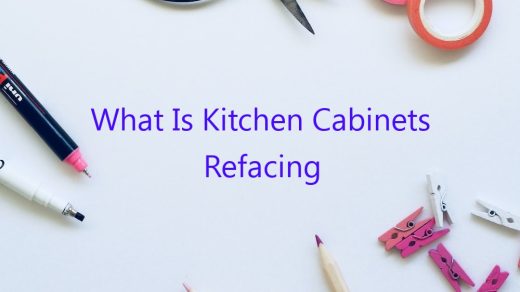People love the natural beauty and warmth of wood countertops in the kitchen. They are also very durable and can last for many years with proper care. If you are thinking of installing wood countertops in your kitchen, here are some tips on how to make them:
1. Choose the right type of wood. Not all types of wood are suitable for countertops. The most popular types of wood for countertops are maple, cherry, and walnut. Other types of wood, such as pine or fir, may not be as durable and may not last as long.
2. Choose the right thickness. The thickness of the wood countertop will depend on the type of wood you choose and the style of your kitchen. Most wood countertops are between 1 and 1-1/2 inches thick.
3. Choose the right finish. There are many different types of finishes that you can choose for your wood countertops. The most popular finishes are oil and wax. However, you can also choose a finish that is resistant to water and scratches.
4. Install the countertops yourself. Installing wood countertops is a project that you can do yourself with a few simple tools. You will need a saw, a drill, and a jigsaw.
5. Seal the countertops. Sealing the countertops is an important step in preserving the beauty and durability of the wood. You can use a sealant that is resistant to water and scratches.
6. Maintain the countertops. To keep your wood countertops looking beautiful, you will need to clean and polish them on a regular basis.
Contents
- 1 What wood can be used to make kitchen countertops?
- 2 Does wood make a good kitchen countertop?
- 3 How much does it cost to build a wood countertop?
- 4 How thick does a wood countertop need to be?
- 5 How do you waterproof a wood countertop?
- 6 What is the downside of using butcher block countertops?
- 7 How long do wood countertops last?
What wood can be used to make kitchen countertops?
Wood kitchen countertops are a popular choice because they are natural and renewable. There are many types of wood that can be used for countertops, but some are better suited for this application than others.
The most popular woods for kitchen countertops are maple, cherry, and oak. These woods are strong and durable, and they are also easy to maintain. They can be cleaned with a damp cloth and a mild detergent, and they can also be treated with a wood sealant to protect them from water and stains.
Walnut, mahogany, and Brazilian cherry are also popular woods for kitchen countertops. These woods are a little more expensive than maple, cherry, and oak, but they are also a little more durable. They can withstand heat and moisture better than other types of wood, and they also require less maintenance.
There are also a few types of wood that are not as common for kitchen countertops, but they can be used if you are looking for a unique or rustic look. Bamboo, cedar, and teak are all good choices for this application, and they are also relatively affordable.
Keep in mind that not all types of wood are suitable for kitchen countertops. Some woods are too soft and will not withstand the wear and tear of everyday use. Also, be sure to choose a wood that is sealed or finished to protect it from moisture and stains.
Does wood make a good kitchen countertop?
There is no definitive answer to the question of whether wood makes a good kitchen countertop. Some people swear by the natural warmth and beauty of wood countertops, while others find them difficult to maintain and susceptible to water damage.
Wood is a natural material, which can give your kitchen a warm, rustic feel. It is also a durable material, which can withstand a lot of wear and tear. However, wood is also susceptible to water damage, and it can be difficult to keep clean.
If you are considering a wood countertop, be sure to factor in the cost of regular maintenance, including sealing and waxing. You should also be prepared for the countertop to change color and appearance over time, as it will naturally age.
How much does it cost to build a wood countertop?
A wood countertop is a beautiful addition to any kitchen. Not only does it add character and style, but it is also a very practical surface that can be used for a variety of tasks. If you are thinking about adding a wood countertop to your kitchen, you may be wondering how much it will cost you.
The cost of a wood countertop will vary depending on the type of wood you choose, the size of the countertop, and the level of customization you require. However, on average, you can expect to pay around $50 to $75 per square foot for a custom wood countertop.
There are a variety of different types of wood that you can choose for your countertop, each with its own unique characteristics. Some of the most popular types of wood include maple, cherry, and walnut. If you are looking for a durable and long-lasting countertop, then you may want to consider using a harder wood such as maple or cherry. If you are looking for a more unique and eye-catching countertop, then you may want to choose a softer wood such as walnut.
When it comes to sizing, you will need to decide how large of a countertop you want. Keep in mind that the larger the countertop, the higher the cost will be. Most standard kitchen countertops are around 25 to 30 square feet. If you need a custom size, the cost will be higher.
In order to get an accurate quote for your custom wood countertop, you will need to provide the countertop fabricator with the dimensions of the countertop, the type of wood you want to use, and any special customization you may require.
If you are looking for a beautiful and stylish countertop that is also affordable, then a wood countertop may be the perfect choice for you. With a wide variety of different types of wood to choose from, you are sure to find the perfect one for your kitchen.
How thick does a wood countertop need to be?
When it comes to wood countertops, there are a few things to consider in terms of thickness. The most important factor is the type of wood you choose. Softwoods like pine are not as durable as hardwoods like oak, so they need to be thicker to prevent dings and scratches.
In general, a wood countertop should be at least 1 1/2 inches thick, but 2 inches is even better. This will provide a good amount of protection against everyday wear and tear, and will also make the countertop more resistant to water damage.
If you’re looking for a more exotic wood, you may want to go even thicker. Some woods, like teak, can be up to 3 inches thick and still be very durable.
It’s also important to remember that wood countertops are not as heat-resistant as other materials like granite or quartz, so you may want to consider a heat pad if you’re planning to use your countertop for cooking.
In the end, the thickness of your wood countertop will depend on the type of wood you choose, the level of durability you need, and your own personal preferences. But as a general rule, 1 1/2 to 2 inches is a good thickness to aim for.
How do you waterproof a wood countertop?
Waterproofing a wood countertop is a process that helps to protect the surface from water damage. There are a few different ways to waterproof a wood countertop, and each method has its own benefits and drawbacks. The most important part of waterproofing a wood countertop is choosing the right sealant or coating to use.
One way to waterproof a wood countertop is to use a sealant. Sealants come in both a liquid and a paste form, and they are applied to the surface of the countertop. Sealants can protect the countertop from water damage and also from stains and scratches.
Another way to waterproof a wood countertop is to use a coating. Coating can be either a spray or a liquid, and it is applied to the surface of the countertop in a similar way to sealant. Coating can help to protect the countertop from water damage, as well as from scratches and stains.
The downside to using a sealant or a coating is that they can be difficult to apply correctly. If the sealant or coating is not applied evenly, it can create a number of problems, including water damage and staining.
The best way to waterproof a wood countertop is to use a sealant that is specifically made for wood countertops. These sealants are designed to be easy to apply, and they will help to protect the countertop from water damage, stains, and scratches.
Waterproofing a wood countertop is an important step in protecting the surface from damage. By using the right sealant or coating, you can help to keep your countertop looking new for years to come.
What is the downside of using butcher block countertops?
Butcher block countertops are a popular choice for many homeowners because of their natural beauty and durability. However, there are a few potential downsides to using butcher block countertops in your home.
One downside of butcher block countertops is that they are susceptible to scratches and water damage. If you are not careful, you can easily damage the surface of your butcher block countertops with knives or other sharp objects. In addition, if they are not properly sealed, butcher block countertops can be susceptible to water damage.
Another downside of butcher block countertops is that they can be difficult to maintain. In order to keep your butcher block countertops looking their best, you will need to seal them regularly and clean them with a gentle cleaner. If you do not take care of them properly, they can start to look faded and stained.
Overall, butcher block countertops are a beautiful and durable choice for your home, but there are a few potential downsides to consider before making your decision.
How long do wood countertops last?
Wood countertops are a popular choice for many homeowners because they offer a natural look and feel. But how long do they last? And what type of care and maintenance is required to keep them looking their best?
The lifespan of a wood countertop can vary depending on the type of wood used, the level of care and maintenance, and the amount of use it receives. In general, most wood countertops will last for five to 10 years with regular care and maintenance.
To help your wood countertops last as long as possible, be sure to clean them regularly with a soft cloth and mild detergent. Avoid using harsh chemicals or abrasive cleaning materials, as these can damage the surface of the countertop.
In addition, be sure to seal the countertops with a quality sealant every few years. This will help protect the wood from moisture and other elements that can damage it over time.
If you’re looking for a countertop that will last for many years, wood is a good option. With proper care and maintenance, a wood countertop can last for up to 10 years or more.




